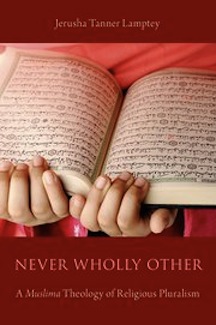New Book: Never Wholly Other: A Muslima Theology of Religious Pluralism
by Jerusha T. Lamptey*
The observation that the Qur’an has a lot to say about various religious communities and religious diversity in general is not novel. Even a casual reader will quickly encounter references to the Children of Israel, the Jews, and the People of the Scripture; discussions of a multitude of prophets, revelations and scriptures; and descriptions of different types of people, including believers, disbelievers, hypocrites, and associators/idolaters.
 Throughout history, these rich and complex facets of the Qur’anic discourse have spurred polemic and apologetic treatises; juridical debates and delineations of the boundaries between believers and disbelievers; and Sufi reflections on the diversity of prophecy in relation to the unicity of God. These facets continue to preoccupy many contemporary scholars, who are particularly interested in how the text is or can be invoked to promote religious intolerance or religious tolerance.
Throughout history, these rich and complex facets of the Qur’anic discourse have spurred polemic and apologetic treatises; juridical debates and delineations of the boundaries between believers and disbelievers; and Sufi reflections on the diversity of prophecy in relation to the unicity of God. These facets continue to preoccupy many contemporary scholars, who are particularly interested in how the text is or can be invoked to promote religious intolerance or religious tolerance.
In Never Wholly Other: A Muslima Theology of Religious Pluralism (New York: Oxford, 2014), I offer a critique of some contemporary engagements with the Qur’an’s discourse on religious diversity. While the majority of these interpretations arising in the US context offer a positive read on the reality of religious diversity, they do so by oversimplifying the Qur’anic content. This occurs by privileging parts of the Qur’an that affirm diversity over other more diversity-ambivalent parts of the text. On an interpretive level, such privileging is accomplished by appealing to methods such as progressive revelation, ethical principles, chronology and abrogation.
In response, I propose a new hermeneutical approach that draws its foundational principles—including Qur’anic unity, polysemy, and textual silence—from Muslim women interpreters of the Qur’an. These foundational principles provide a unique starting point, but they require supplementation in order to avoid oversimplification of the Qur’an’s complex discussion of religious diversity. I find this in a critical retrieval of Toshihiko Izutsu’s method of semantic analysis, in particular his focus on semantic fields and relational meaning of Qur’anic concepts.
Combining the methods of Muslim women interpreters of the Qur’an and Izutsu, I then engage in a close and relational re-reading of the text. This re-reading begins with the identification of two distinct, yet overlapping, semantic fields: that of taqwā (God-consciousness) and that of umma (community of revelation). I then explore the complex interconnections among central Qur’anic concepts, including belief, disbelief, submission, association, and hypocrisy, and argue that they fall within the semantic field of taqwā, rather than umma. This means that these concepts or characteristics are not automatically affiliated with particular communities.
This argument leads to my constructive articulation of a Muslima theology of religious pluralism in which I offer an integrated account of the Qur’anic discourse on religious diversity, weaving together questions of creation, human nature, revelation(s), human diversity and interactions, and divine evaluation.
*Lamptey is Assistant Professor of Islam and Ministry at Union Theological Seminary in the City of New York. She earned her Ph.D. in Theological and Religious Studies, with a focus on Religious Pluralism, from Georgetown University in 2011. Her research focuses on theologies of religious pluralism, comparative theology, and feminist theology.
© International Qur’anic Studies Association, 2014. All rights reserved.
